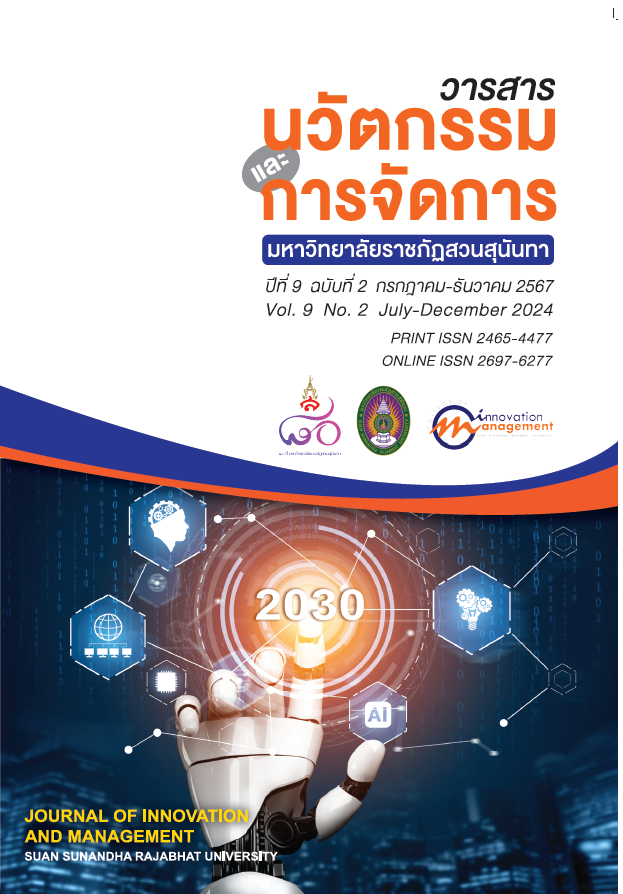Approach to Development of Local Economic Capital to Increase the Capacity of Community Enterprise Entrepreneurs in Phetchaburi Province
Keywords:
Development of Local Economic Capital, Entrepreneurial Capacity, Community EnterprisesAbstract
The objectives of this research are (1) to analyze the causal relationship pathways that influence the development of local economic capital to increase the capacity of community enterprise entrepreneurs in Phetchaburi Province. (2) To create guidelines for the development of local economic capital to increase the capacity of community enterprise entrepreneurs in Phetchaburi Province, and (3) to examine guidelines for the development of local economic capital to increase the capacity of community enterprise entrepreneurs in Phetchaburi Province. Using quantitative and qualitative research methodologies, data were collected from a sample of community enterprise entrepreneurs in Kaeng Krachan District, Phetchaburi Province. 360 people to study related factors. After that, it was brought to 9 experts to analyze and create the guidelines through group discussions, and then to 5 other experts to evaluate the guidelines for implementation. For data analysis, descriptive statistics and structural equation model analysis were used. The qualitative data section uses content analysis. The results show that the strategy of market and social capital has a positive direct influence on local economic capital and competitiveness. Local economic capital is an important transmission variable. The proposed development approach consists of 5 main approaches, 24 processes and 74 methods, covering multi-dimensional development. Social capital, innovation and technology, sustainability, and competitiveness. This approach has been evaluated at the "most" level in terms of accuracy, appropriateness, The average value is between 4.57 and 4.62, reflecting the potential for implementation to develop community enterprises in Phetchaburi Province in an efficient and sustainable manner.
References
Chaiphrom, N. (2020). Social capital and the performance of community enterprises: A case study of Nan Province. Chiang Mai University Journal of Economics and Business Administration, 30(2), 120-135. (in Thai)
Chuamuangphan, N., Chuamuangphan, K., & Sagprakob, R. (2023). Innovation management for community enterprise products: A case study of Phetchaburi Province, Thailand. Journal of Community Development Research, 16(2), 45-58.
Creswell, J. W., & Plano Clark, V. L. (2018). Designing and conducting mixed methods research. 3rd ed. SAGE Publications.
Cronbach, L. J. (2001). Essentials of psychological testing. 5th ed. Harper Collins.
Etikan, I., & Bala, K. (2017). Sampling and sampling methods. Biometrics & Biostatistics International Journal, 5(6), 00149.
Etikan, I., Musa, S. A., & Alkassim, R. S. (2016). Comparison of convenience sampling and purposive sampling. American Journal of Theoretical and Applied Statistics, 5(1), 1-4.
George, D., & Mallery, P. (2020). IBM SPSS Statistics 26 step by step: A simple guide and reference. 16th ed. Routledge.
Hair, J. F., Black, W. C., Babin, B. J., & Anderson, R. E. (2019). Multivariate data analysis. 8th ed. Cengage Learning.
Hu, L. T., & Bentler, P. M. (1999). Cutoff criteria for fit indexes in covariance structure analysis: Conventional criteria versus new alternatives. Structural Equation Modeling, 6(1), 1-55.
Kline, R. B. (2016). Principles and practice of structural equation modeling. 4th ed. Guilford Press.
Kumnerdpet, W., & Sinclair, A. J. (2023). Challenges and opportunities for community-based enterprises in Phetchaburi Province: A sustainable livelihood approach. Sustainability, 15(4), 3287.
Lee, R., & Jones, T. (2020). The impact of social capital on the performance of community enterprises: A systematic review. Journal of Co-operative Organization and Management, 8(1), 1-18.
Levy, P. S., & Lemeshow, S. (2013). Sampling of populations: Methods and applications (4th ed.). John Wiley & Sons.
Linstone, H. A., & Turoff, M. (Eds.). (2002). The Delphi method: Techniques and applications. Addison- Wesley.
Phongpipat, W. (2020). Community-based cultural tourism product development: A case study of Ban Bat community, Phetchaburi province. Veridian E-Journal, 12(3), 3581-3598. (in Thai)
Phongsakonrangsin, P., Jindawan, W., & Bunsit, T. (2022). Factors affecting the success of community enterprises in Phetchaburi Province. Burapha University Journal of Business Management, 11(2), 39-54. (in Thai)
Polnyotee, M., & Thadaniti, S. (2022). Community-based tourism: A strategy for sustainable tourism development in Phetchaburi Province, Thailand. Journal of Tourism and Cultural Change, 20(3), 344-363.
Richards, G. (2021). Developing Cultural Tourism Products in a Post-COVID World. Journal of Tourism Studies, 33(2), 45-58.
Saengchai, S., Joemsittiprasert, W., & Jermsittiparsert, K. (2023). Digital transformation challenges for community enterprises in Phetchaburi Province. Journal of Asian Finance, Economics and Business, 10(2), 179-190.
Sangthong, C. (2022). Online marketing strategies for community enterprises: A case study of OTOP products in Phetchaburi Province. Thammasat University Journal of Marketing, 14(2), 157-172. (in Thai)
Skulmoski, G. J., Hartman, F. T., & Krahn, J. (2007). The Delphi method for graduate research. Journal of Information Technology Education: Research, 6(1), 1-21.
Smith, M. K., & Robinson, M. (2022). Culture, Tourism, and Regeneration: The Role of Innovation. International Journal of Tourism Research, 24(1), 67-80.
Srisuk, P. (2022). Value chain analysis of the Thai tourism industry: guidelines for increasing competitiveness. Tourism Journal, 18(1), 75-90. (in Thai)
Suebsook, N., & Prasertsin, A. (2024). Product development and packaging design for community enterprises: A case study of Phetchaburi Province. ASEAN Journal of Management & Innovation, 11(1), 84-97.
Suksamran, C. (2024). Development of competitiveness of community enterprises in the digital age: The role of information and communication technology. Information Technology Academic Journal, 25(1), 65-80. (in Thai)
Tabachnick, B. G., & Fidell, L. S. (2019). Using Multivariate Statistics (7th ed.). Pearson.
Timothy, D. J. (2023). Cultural Heritage and Tourism in the Developing World. Annals of Tourism Research, 92, 102962.
Turner, R. C., & Carlson, L. (2003). Indexes of item-objective congruence for multidimensional items. International Journal of Testing, 3(2), 163-171.
Vonglao, P. (2017). Application of fuzzy logic to improve the Likert scale to measure latent variables. Kasetsart Journal of Social Sciences, 38(3), 337-344.
Wattanacharoensil, W., & Schuckert, M. (2024). Navigating cultural preservation and tourism development: Insights from Thailand's UNESCO Creative Cities. Journal of Tourism and Cultural Change, 22(1), 67-85.
Downloads
Published
How to Cite
Issue
Section
License
Copyright (c) 2024 Journal of Innovation and Management

This work is licensed under a Creative Commons Attribution-NonCommercial-NoDerivatives 4.0 International License.
See Publication Ethics https://so03.tci-thaijo.org/index.php/journalcim/Ethics






